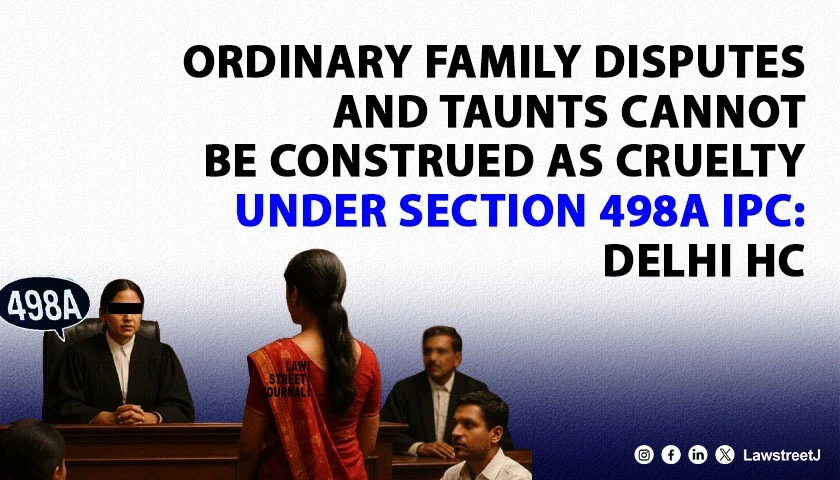New Delhi: The Delhi High Court recently held that mere taunts, family disagreements, or the ordinary wear and tear of matrimonial life do not amount to cruelty under Section 498A of the Indian Penal Code. The Court observed that vague and omnibus allegations against distant relatives of the husband, who do not even reside with the complainant, cannot justify prosecution under Sections 498A and 406 of the IPC.
Justice Amit Mahajan was hearing a petition filed under Section 482 of the Code of Criminal Procedure seeking quashing of FIR No. 536/2022 registered at Police Station Adarsh Nagar for offences under Sections 498A/406/34 IPC against the petitioners, who were the aunt (massi) and cousin of the complainant’s husband. The FIR had been lodged by the complainant alleging harassment and cruelty in connection with dowry demands.
The marriage between the complainant and her husband was solemnized on November 9, 2019. It was alleged that before the marriage, the husband’s family demanded that the wedding be conducted lavishly, which led the complainant’s parents to spend approximately ₹30 lakhs. Further allegations were made that after the marriage, she was harassed for money and subjected to cruelty by her husband and in-laws. The complainant also claimed that the petitioners, who lived nearby, interfered in her marital life, passed taunting remarks, and supported her in-laws during family disputes.
The petitioners submitted that they were distant relatives and had been falsely implicated in the matter. It was argued that the allegations were general in nature, without any specific incidents indicating cruelty or misappropriation of stridhan. The petitioners relied on the judgments of the Supreme Court in Kahkashan Kausar @ Sonam v. State of Bihar [(2022) 6 SCC 599] and Geeta Mehrotra v. State of U.P. [(2012) 10 SCC 741], to contend that distant relatives cannot be made accused on the basis of sweeping or casual allegations.
The counsel for the State and the complainant opposed the petition, stating that specific allegations were made against the petitioners both in the FIR and in the complainant’s statement under Section 161 CrPC. It was further submitted that since the matter was at the stage of charge, the High Court should not interfere with the proceedings.
The Court referred to the settled principles regarding the exercise of powers under Section 482 CrPC, observing that while such powers should be used sparingly, proceedings can be quashed if they amount to an abuse of process or where the allegations are inherently improbable. The Court cited Indian Oil Corporation v. NEPC India Ltd. [(2006) 6 SCC 736] and State of Odisha v. Pratima Mohanty [(2022) 16 SCC 703], emphasizing that the Court is empowered to prevent miscarriage of justice when continuation of proceedings serves no purpose.
Justice Mahajan also referred to the recent decision in Payal Sharma v. State of Punjab [2024 SCC OnLine SC 3473], where the Supreme Court clarified that the expression “relative” in Section 498A must be understood in its ordinary sense and cannot automatically include distant family members unless their active involvement in cruelty is established. The Court further noted that there is a growing tendency to over-implicate extended family members, which dilutes the very purpose of Section 498A, enacted to curb genuine instances of cruelty and dowry harassment.
The Court observed that the allegations in the present case, even if taken at face value, reflected ordinary family friction and not the kind of wilful conduct envisaged under Section 498A, which requires cruelty likely to drive a woman to suicide or cause grave injury or danger to her life or health. It also noted that the vague allegations regarding stridhan did not meet the requirements under Section 406 IPC.
The Court held that mere taunts, casual remarks, or interference in daily life, without specific evidence of harassment linked to dowry, cannot constitute cruelty within the meaning of Section 498A. The allegations were found insufficient to continue criminal prosecution against the petitioners, who were living separately and not involved in the day-to-day affairs of the complainant’s matrimonial home.
Accordingly, the Court quashed the FIR and all consequential proceedings against the petitioners, observing that continuation of the case would amount to an abuse of process of law. However, it clarified that if any fresh material evidence emerges during the trial, the Trial Court would be free to take appropriate action in accordance with law.
Case Title: Shashi Arora & Anr. v. State Through Commissioner of Police & Ors.
Case Number: W.P. (CRL) 2711/2022
Date of Judgment: November 3, 2025
Coram: Justice Amit Mahajan
For the Petitioners: Mr. Biraja Mahapatra, Mr. Nalin Hingorani, and Mr. Raunak Jain, Advocates
For the Respondents: Ms. Rupali Bandopadhya, ASC for the State with Mr. Abhijeet Kumar and Ms. Amisha Gupta, Advocates



![Delhi High Court Sets Aside Arbitral Tribunal's Award Against NHAI in Highway Project Delay Case [Read Judgment]](/secure/uploads/2023/07/lj_9605_23374c2e-392c-4491-a2fe-f2f12fc5272f.jpg)
![Delhi Court Rejects Stay Request in Defamation Case Against Rajasthan CM Ashok Gehlot [Read Order]](/secure/uploads/2023/08/lj_5208_80de1ddc-d76a-4f7f-b180-408e3ae14fb4.jpg)







